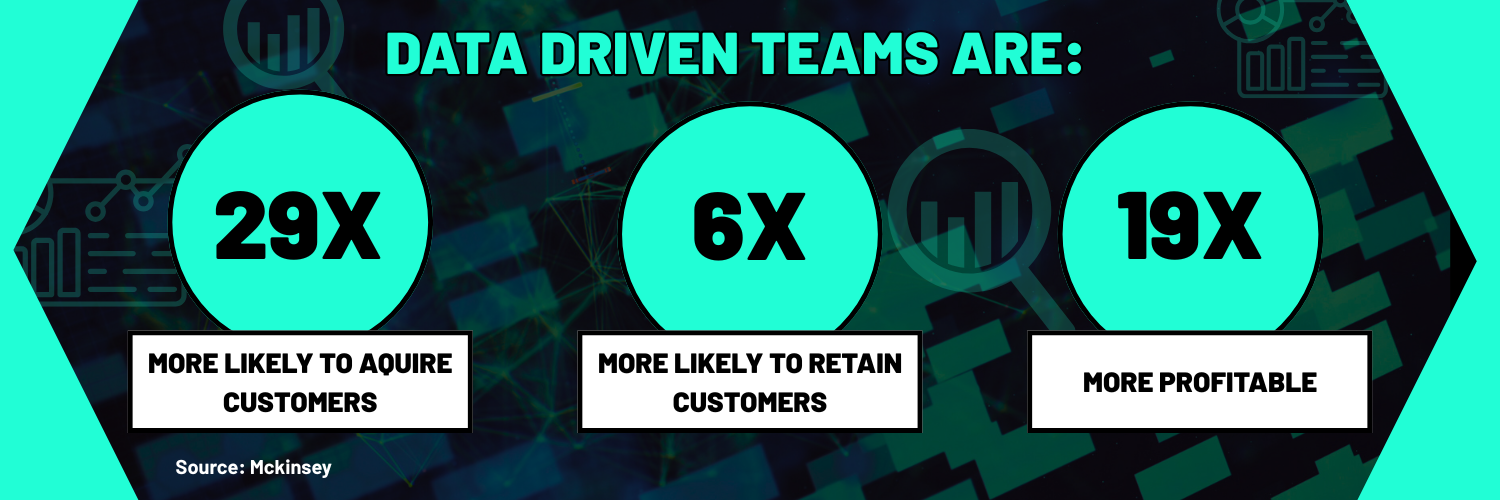
Content Menu
UNLOCKING BUSINESS GROWTH: WHY DATA LITERACY TRAINING IS KEY TO A SMARTER, SAFER BUSINESS
Working with data is no longer exclusive to the domain of technical teams. From Finance and HR to Marketing and Operations, every department interacts with data daily, whether it’s tracking customer behaviour, analysing employee engagement, or spotting productivity patterns.
But here’s the challenge: too many employees still lack the skills and confidence to work with data effectively. This results in missed opportunities, slower decision-making, and, in the worst cases, compromised security.
With 84% of leaders considering data-driven decision making the most critical skill in their teams, providing opportunities for employees to upskill is now a key differentiator for business growth.
Why data skills are the new universal language
Data has become the universal language of modern work. Once reserved for analysts, it now underpins every decision across the business:
- Marketing teams refine strategy with campaign data
- HR professionals monitor engagement and retention trends
- Finance teams forecast budgets using performance data
- Operations teams identify bottlenecks and productivity gaps
When data literacy extends beyond technical teams, organisations unlock faster, more confident decision-making at every level. This is what turns raw information from background noise into a true competitive advantage.
The ripple effect of data literacy
The impact of data literacy training is felt at every level of an organisation. For individuals, it builds confidence, helping people move beyond second-guessing dashboards to presenting insights with clarity. For teams, it fosters stronger collaboration, as discussions shift from gut instinct to evidence-based decision-making. At an organisational level, it fuels agility by giving leaders access to richer, more accurate insights across departments, enabling faster and better outcomes.
More than just a practical skill, data literacy is a catalyst for workforce transformation. When employees can interpret and apply data effectively, they evolve from task executors into problem-solvers and strategic contributors. Evidence-driven decision-making empowers staff to take ownership of their work and strengthens cross-team collaboration. Over time, this shift creates a culture of agility and accountability, where people are confident in embracing new technologies, adapting to change, and driving continuous improvement.
The results speak for themselves. Research shows that organisations embedding data-driven decision-making are 19 times more profitable than those that do not. This is a clear sign that data literacy isn’t simply a skill to acquire, but a powerful driver of long-term growth and resilience.

The hidden risks of ignoring data literacy
Failing to invest in data literacy training creates real vulnerabilities as well as slowing progress. Teams without the right skills miss opportunities by being unable to spot patterns or uncover insights that could fuel growth. Workflows also become inefficient, as analysts are bogged down with basic requests that other staff could easily manage with the right training.
Perhaps most critically, when employees aren’t confident working with data, they’re less likely to notice when it’s biased. And if that bias slips through, it can end up baked into the tools and decisions that shape our lives, excluding some groups and reinforcing unfair treatment.
Data doesn’t just decide how we present results or tweak a campaign. It affects who gets access to services, how quickly someone is diagnosed with a health condition, and whether a family qualifies for welfare support. In many ways, data lays the groundwork for the society we live in. That’s why it’s so important to give employees the skills to spot bias early, and ensure that the products and services you create reflect the diverse society we live in.
Healthcare AI Misdiagnosis and Underserved Patients (2025)
A study at the University of Birmingham highlighted that AI systems in healthcare are misfiring due to biased, unrepresentative data inputs:
One digital health assistant frequently misdiagnosed heart attacks in women—based on symptoms that present differently from those in men—and, alarmingly, directed some patients toward psychiatric referrals instead of emergency care.
Another algorithm, designed to prioritize patients by health risk, systematically underestimated the needs of Black patients because it relied on health expenditure [lower for these communities] not actual medical need.
These systems can delay or reduce necessary care for underrepresented groups. This isn’t just a technical failure, it’s a life-threatening risk rooted in biased data and lack of cross-functional oversight.
UK Government AI Tools in Welfare, Immigration, and Fraud Detection (2023–2024)
Investigations have revealed that AI systems used by UK government agencies—including the Department for Work and Pensions and the Home Office—automated decisions around welfare benefits, immigration, and marriage licenses, with disproportionate negative impacts on certain demographic groups:
- A benefits algorithm may have wrongly removed support from vulnerable applicants.
- An AI tool for identifying sham marriages flagged cases more often among particular nationalities, suggesting bias in how data and rules were applied.
This prompted a public AI register for transparency and increased scrutiny of algorithmic fairness in policymaking. These are not theoretical risks—they directly influenced citizens’ lives and access to services.
Australian AI Recruitment Tools Discriminate Against Accented and Disabled Candidates (2025)
A University of Melbourne study found AI hiring tools used in Australia struggle to correctly transcribe or assess candidates with non-native accents or speech-related disabilities, with error rates reaching up to 22%. These tools’ reliance on US-centric data led to systemic bias within their functionality.
As a result, disadvantaged groups risk being unfairly excluded from job opportunities, perpetuating inequality in hiring processes.
How Code First Team’s Data for Business course makes a difference
Our Data for Business course is designed to give non-technical professionals the skills and confidence to work with data in their everyday roles. In just four weeks, learners will:
- Gain an introduction to data fundamentals, including ethical usage, quality, and storytelling
- Learn to use low/no-code tools to answer real business questions
- Apply statistics to understand significance and create stronger reports
- Explore data management practices, including process automation and an introduction to AI and ML methods
This isn’t about turning every employee into a data scientist. It’s about giving your teams practical, accessible skills to make smarter decisions, create unbiased tools, and contribute more confidently to your organisation’s success.
Future-proofing starts with your people
At Code First Teams, we believe future-ready businesses are built by future-ready people. Upskilling your workforce with the data literacy training needed to keep pace with technological change is one of the most effective ways to unlock that readiness.
With Data for Business, every team member, regardless of background, can learn to use data as a tool for sharper decisions, stronger collaboration, and enhanced security.
Because in today’s world, data literacy isn’t just for analysts. It’s for everyone.



















